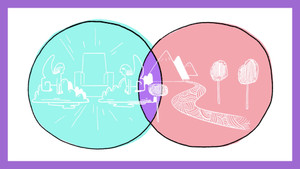

Anointing
Explore an ancient practice that marks people and places as bridges between Heaven and Earth.
Reflect
Read 1 Samuel 16:1-13, Leviticus 8:9-12, Genesis 28:10-22, and Leviticus 8:10-11. Who or what is anointed in these passages? What does the anointing oil mean when it gets poured onto certain people, objects, or places?
Read Exodus 30:22-33 to see a recipe for anointing oil. These specific plants are not mentioned in the Eden narrative (Genesis 2), but they connect to Eden symbolically as lush, beautiful, and good garden plants. What point is God making? Why instruct the people to use Eden-like plants to make anointing oil?
Read Genesis 2:4-17 and notice the analogy between water and God’s Spirit as the fundamental sources of life. Take a look at Isaiah 32:15-18 and Isaiah 44:2-4. How does Isaiah draw on this analogy?
How does Jesus’ baptism (Mark 1:1-15) act as his “anointing” if there is no oil present? After the water and Spirit “anointing” in Genesis 2, other anointings always happen with symbolic oil. But Jesus’ baptism scene is different—he gets anointed with water and Spirit like the human in Genesis 2. Why does this matter? How does it help us better understand the act of anointing a person?
Read Acts 2:1-21. The specific word “anointing” does not show up in this story, but the description of the event in the larger context of the Bible tells us that this is an anointing of the 12 apostles. What are Jesus’ apostles anointed with, and how would you describe the significance and purpose of this anointing?
Downloads
Biblical Themes

The Wilderness

Redemption

The Exodus Way

The Mountain

Heaven & Earth

The Messiah

The Covenants

Holiness

Sacrifice and Atonement

The Law

Gospel of the Kingdom

Image of God

Day of the Lord

Holy Spirit

Public Reading of Scripture

Justice

Exile

The Way of the Exile

Son of Man

Temple

Generosity

Sabbath

Tree of Life

Water of Life

The Test

Eternal Life

Blessing and Curse

The Last Will Be First

Anointing

The City
